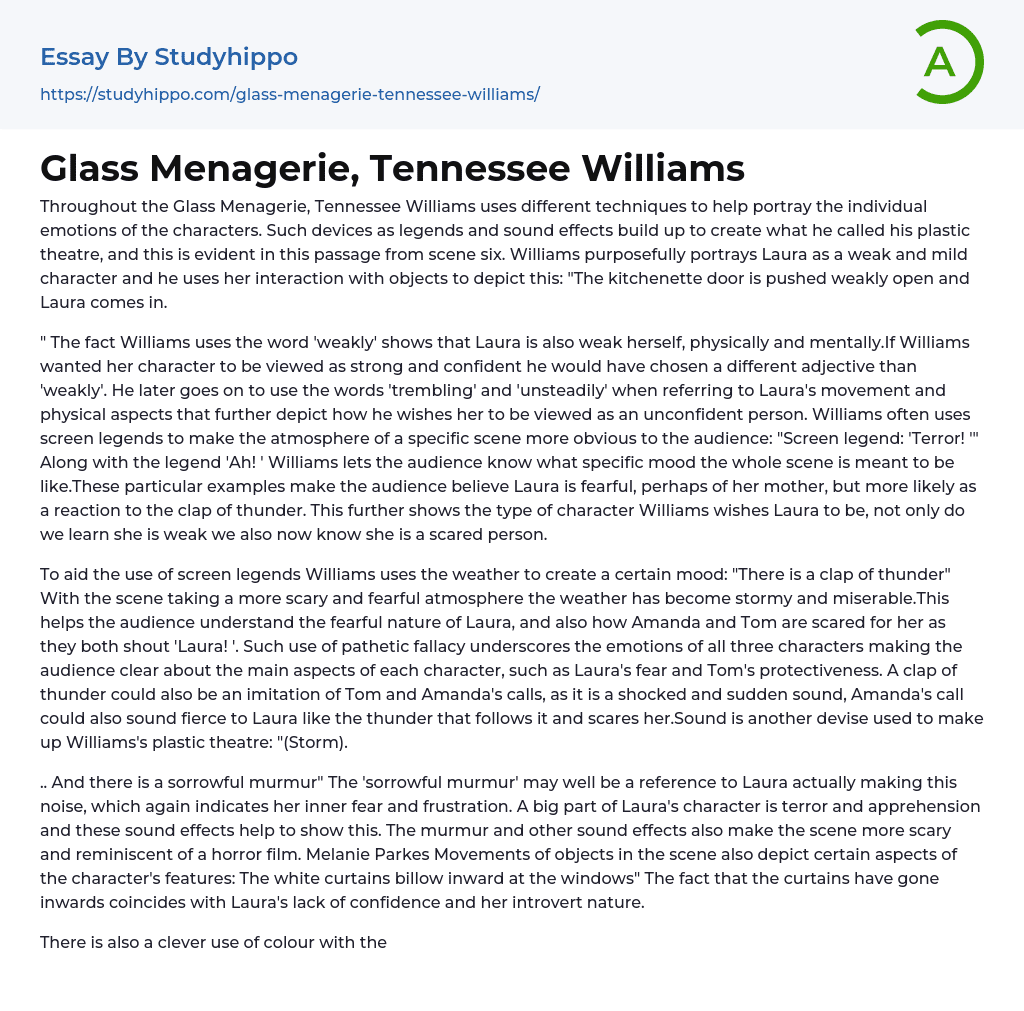Throughout the Glass Menagerie, Tennessee Williams uses different techniques to help portray the individual emotions of the characters. Such devices as legends and sound effects build up to create what he called his plastic theatre, and this is evident in this passage from scene six. Williams purposefully portrays Laura as a weak and mild character and he uses her interaction with objects to depict this: "The kitchenette door is pushed weakly open and Laura comes in.
" The fact Williams uses the word 'weakly' shows that Laura is also weak herself, physically and mentally.If Williams wanted her character to be viewed as strong and confident he would have chosen a different adjective than 'weakly'. He later goes on to use the words 'trembling' and 'unsteadily' when referring to Laura's moveme
...nt and physical aspects that further depict how he wishes her to be viewed as an unconfident person. Williams often uses screen legends to make the atmosphere of a specific scene more obvious to the audience: "Screen legend: 'Terror! '" Along with the legend 'Ah! ' Williams lets the audience know what specific mood the whole scene is meant to be like.These particular examples make the audience believe Laura is fearful, perhaps of her mother, but more likely as a reaction to the clap of thunder. This further shows the type of character Williams wishes Laura to be, not only do we learn she is weak we also now know she is a scared person.
To aid the use of screen legends Williams uses the weather to create a certain mood: "There is a clap of thunder" With the scene taking a more scary and fearful
atmosphere the weather has become stormy and miserable.This helps the audience understand the fearful nature of Laura, and also how Amanda and Tom are scared for her as they both shout 'Laura! '. Such use of pathetic fallacy underscores the emotions of all three characters making the audience clear about the main aspects of each character, such as Laura's fear and Tom's protectiveness. A clap of thunder could also be an imitation of Tom and Amanda's calls, as it is a shocked and sudden sound, Amanda's call could also sound fierce to Laura like the thunder that follows it and scares her.Sound is another devise used to make up Williams's plastic theatre: "(Storm).
.. And there is a sorrowful murmur" The 'sorrowful murmur' may well be a reference to Laura actually making this noise, which again indicates her inner fear and frustration. A big part of Laura's character is terror and apprehension and these sound effects help to show this. The murmur and other sound effects also make the scene more scary and reminiscent of a horror film. Melanie Parkes Movements of objects in the scene also depict certain aspects of the character's features: The white curtains billow inward at the windows" The fact that the curtains have gone inwards coincides with Laura's lack of confidence and her introvert nature.
There is also a clever use of colour with the word 'white' indicating Laura is pure, innocent yet frail. Williams describes the night as dark and blue also to make the scene terrifying, something that is common in more horror based productions. Along with this and the murmur from the storm, the curtains moving in the wind
is also stereotypical of a horror film, which is what Williams is trying to show in this scene.Tennessee Williams's use of such techniques as screen legends, sounds, colours, pathetic fallacy and movement of objects help make the audience more aware of not only the atmosphere of a specific scene but also the emotional aspects of the characters on stage, especially Laura on this occasion. This is shown by the use of the screen legends appearing to be Laura's thoughts and moods, colours, objects and the weather reflect Laura's moods, emotional and physical state.
- Pressure essays
- Confidence essays
- Disgrace essays
- Lost essays
- Harmony essays
- Fairness essays
- Sarcasm essays
- Respect essays
- Responsibility essays
- Empathy essays
- Suffering essays
- Suspense essays
- Fear essays
- Feeling essays
- Loneliness essays
- Ambition essays
- Tolerance essays
- Hope essays
- Inspiration essays
- Kindness essays
- Shame essays
- Desire essays
- Doubt essays
- Grief essays
- Hate essays
- Laughter essays
- Passion essays
- Pride essays
- Forgiveness essays
- Happiness essays
- Humanity essays
- Loyalty essays
- Guilt essays
- Honesty essays
- Betrayal essays
- Need essays
- Boredom essays
- Courage essays
- Regret essays
- Anger essays
- Honor essays
- Honesty Is The Best Policy essays
- John Locke essays
- 9/11 essays
- A Good Teacher essays
- A Healthy Diet essays
- A Modest Proposal essays
- A&P essays
- Academic Achievement essays
- Achievement essays




